ivandzyuba/iStock/GettyImages
Focused use of lemon refines fine cooking and makes good food great. Lemon is often the "secret" ingredient in a dish that brightens and clarifies the flavors. It defines the individual aromas in a melange and puts them into context. You don't need much lemon, either, for it to work its magic, since its essence -- not its tartness -- resides in the volatile oils in the zest. You can extract the essential oil from lemons two ways: steeping in a solvent, such as ethyl alcohol, or steeping in pure fat, such as oil.
Check the lemons for any slits, cracks, spots or other signs of damage or spoilage. Select only the freshest lemons for steeping.
Rinse the lemons under cool water while scrubbing them with a vegetable brush. Don't scrub so vigorously that you remove the zest. Dry the lemons thoroughly with a paper towel.
Pour high-quality vegetable oil, such as extra-virgin olive oil, or high-quality clear liquor, such as vodka, into a clean and dry airtight food-storage container.
Zest or slice the yellow layer of the peel from two lemons using a plane grater or paring knife for each cup of oil or liquor. Add the lemon zest to the oil or liquor.
Seal the container. Place the infusing oil or liquor in a cool cupboard.
Steep lemons in oil for one to two weeks. Taste the oil with a clean spoon after a week. You don't want to introduce bacteria by tasting with your finger or a previously used utensil. Add a few more days of steeping if you feel it needs it.
Steep lemons in liquor for two days and taste. Taste every day until it reaches the flavor strength you want.
Line a sieve or colander with two or three layers of cheesecloth and set it over another container or bowl. Slowly pour the lemon-infused oil or liquor through the cheesecloth, allow the colander or sieve to drain each time before adding more.
Press on the lemon zest with the back of a clean spoon after the oil or liquor finishes draining to press out any last drops of essential oil.
Transfer the oil to an airtight bottle and store it in the refrigerator for up to one month. You can also use an airtight food-storage container or canning jar to store the oil.
Transfer the lemon-infused liquor to an airtight bottle and store it for up to six months in the freezer.
Related Articles

How to Make Limoncello
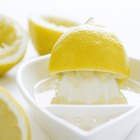
How to Make Lemonade by Boiling the ...

How to Infuse Vodka With Figs

Homemade Limoncello Recipe
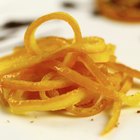
How to Substitute Orange Extract for ...
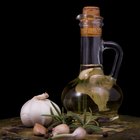
How to Make Basil Oil

How to make Orange Extract

How to Make Lemon Cologne

How to Make Men's Cologne

How to Make Roll-On Perfume

What Drinks Can I Make With Banana Rum?
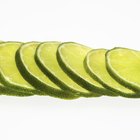
How to Dry Limes

How to Store Lemons Long-Term
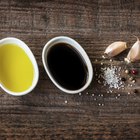
How to Mix Your Own Vinegar & Oil

How to Make Natural Pectin From Lemons
How Long Does Watermelon Stay Fresh ...
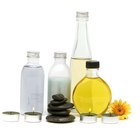
How to Make Cologne From Essential Oils
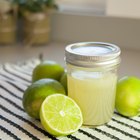
What Is Lime Cordial?

Difference Between Peppermint Extract & ...
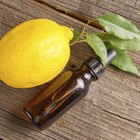
Lemon Essential Oil for Eczema
References
Resources
Tips
- Buy locally grown, organic lemons within in a day or two of harvest when possible for the freshest flavor.
- Add fresh whole herbs to the oil when you steep lemons to add floral notes to the aroma and flavor.
Warnings
- Infused oils carry with them the risk of botulism. Clostridium botulinum, the microorganism responsible for botulism, is sometimes present on fresh vegetables and herbs. Although lemons have a pH too low for c. botulinum to survive, you must still practice safety precautions: keep lemon-infused oil in an airtight bottle in the refrigerator for no longer than one month, and discard it if it shows any sign of spoilage or rancidness, such as off-colors or odors.
Writer Bio
A.J. Andrews' work has appeared in Food and Wine, Fricote and "BBC Good Food." He lives in Europe where he bakes with wild yeast, milks goats for cheese and prepares for the Court of Master Sommeliers level II exam. Andrews received formal training at Le Cordon Bleu.